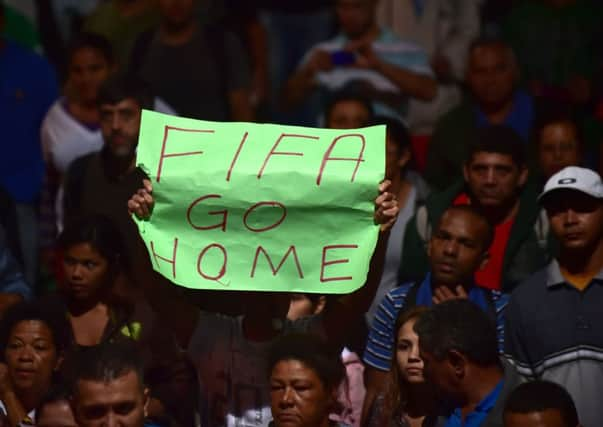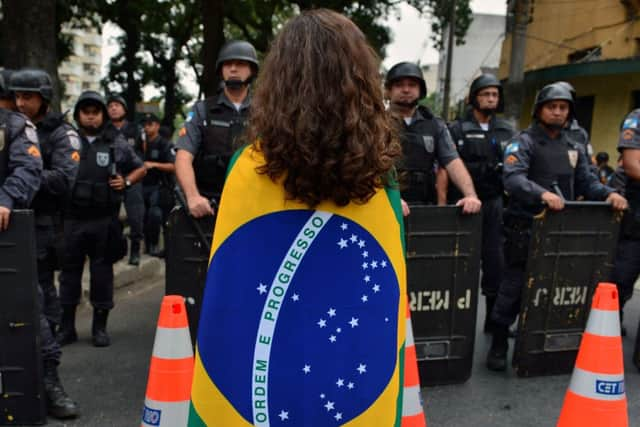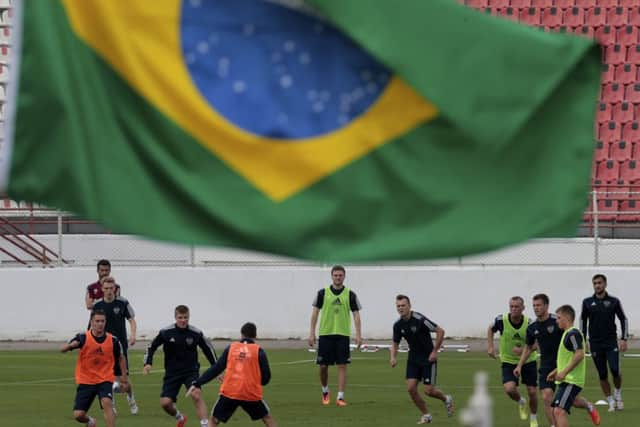Grant Jarvie: Will the World Cup deliver?


The long-awaited goal-line technology will be introduced for the first time at this World Cup and should help settle any on-field disputes but it is the off-field tensions that are proving to be more of an issue.
Given that economists now tell us that hosting major sports tournaments does tend to cheer the nation up, Brazilian President Dilma Roussef will be hoping for such a psychic income.
Advertisement
Hide AdAdvertisement
Hide AdShe might also be well advised to heed the words of the Liverpool and Uruguay striker Luis Suarez who, when talking about Latin America, pointed out that the border between soccer and politics is vague and that there is a long list of governments that had fallen or had been overthrown after the defeat of the national team.


Off the Pitch
Brazil’s national team started its World Cup preparations amid protests in Rio de Janeiro. ‘No World Cup’ was the message that met Brazil’s coach Felipe Scolari and the squad of 22 players.
The stakes are high and if Brazil fails to make it to the final stages it could lead to further social unrest. On the other hand if Brazil wins will it lead to increased levels of happiness amongst Brazilians, including the protesters?
The June 2013 protests were initially concentrated in Sao Paulo but the protest movement expanded to more than 350 cities bringing millions onto the streets.


The scale and velocity of the protests forced the authorities to cancel a proposed increase in transport fares, posed a real threat to the Confederations Cup and the preparations for the 2014 FIFA World Cup.
The unrest reflected a frustration over issues such as international education levels, the quality of public services, high levels of poverty and unemployment, rising food costs, low levels of affordable housing and concerns about corruption in high office.
The estimated $9billion cost of hosting the 20th FIFA World Cup has been met with threats of industrial action and a widespread attitude among the population that they prioritise health and education over football.
For many people the reality of life in Brazil contrasts bleakly with the optimism espoused by political leaders and authorities.
Advertisement
Hide AdAdvertisement
Hide AdThe BBC Panorama investigation shown on the 4th of June ‘In the shadow of the stadiums’ exposed a world of poverty, lack of access to education, violence and child exploitation and government efforts to break the links between each of these.
The unrest that has gripped Brazil is reminiscent of other protests that have been heard in the build up to other major sporting events.
Out of Pocket
It is not just a football team that wins the World Cup, the host country does too. Or at least, there are expectations that the hosts will do well financially. At the 2010 World Cup in South Africa, ‘It’s Africa’s hour’ seemed to be a key message.
Several months before that World Cup got underway, there was a violent demonstration in Riverlea, the black township adjacent to Soccer City Stadium in Johannesburg, a ground that had been refurbished and extended at an estimated cost of £308 million.
The residents of the township questioned why the government was pouring money into the World Cup instead of housing.
And the 2010 World Cup made money. The tournament is a massive money-spinner for FIFA. According to accounts, 93 per cent of its income between 2007 and 2010 was accounted for by event-related revenue.
Television rights for the tournament accounted for $2,408 million of FIFA’s $2,448 million income from broadcast. It was similar for FIFA’s income from marketing rights, with the World Cup bringing in $1,072 million of its $1,097 million. Overall, South Africa 2010 accounted for 87 per cent of FIFA’s total revenue for the period.
But where did the money go? In the same edition of the Sunday Times that devoted 11 pages to exposing both FIFA and Qatar a smaller investigation led with a heading ‘Plenty of glory but cup hosts often end out of pocket’.
The South African figures read –
Advertisement
Hide AdAdvertisement
Hide AdSA Government spend on building stadiums and infrastructure - £3bn
Amount earned on the investment - £332m
Economic growth slowed from 4.6% in the first quarter of 2010 to 3.2% in the second and 2.6% in the third, the periods covered by the event
But it is still unclear how much of $2,448 million made by FIFA on television and marketing rights stayed in South Africa.
One BBC report from Sao Paulo on 5 June suggested that the World Cup in Brazil will earn FIFA $4 billion of which $2billion will be FIFA profit.
World Cup Happiness?
Rousseff has stated that she expects Brazilians to show visiting fans the happiness and hospitality that Brazil is famed for.
Earlier in the year while visiting the FIFA President, the Brazilian President’s key message appeared to be that the country was prepared to use the power of football to tackle key matters and leave an important social legacy,
She must be hoping that revenue from the FIFA World Cup stays in Brazil. That such events make money is not open to question, but where it goes and how it is used is still unclear. Most tournaments have done well to cover the costs of hosting the tournament but rarely do they make a country rich.
But does hosting a World Cup make a nation happier? Apparently it does. Economists have taken the European Commissions happiness data for 12 countries over a 25-year period and checked whether it correlated with sports tournaments. They concluded that while people did not necessarily become happier when the national team did well, the country that hosted a football tournament reported increased happiness among its population.
Advertisement
Hide AdAdvertisement
Hide AdIf it turns out that if hosting the FIFA World Cup does not make Brazil rich then President Rouseff may at least hope the electorate may be happier, which will be key going into a general election in October.
Football Saving Lives
There is at least one other reason that hosting the World Cup might be welcomed. Hosting major football tournaments would appear to assist with social cohesion.
Compared with the month when a national team is playing in a world cup tournament with the same month when it is not, fewer people die and suicide rates tend to be lower for both men and women. According to Kuper and Symanski’s 2014 account of football fandom, this holds true for Austria, Czech Republic, Denmark, France, Germany, Greece, Ireland, Netherlands, Norway, Spain, Sweden and Switzerland.
Some 130 years after two Scots, Charles Miller and Thomas Donohoe, kick-started a football revolution in Brazil, the current government must be hoping that the 2014 FIFA World Cup does not stoke up further turbulence.
The administration will be hoping not only that the revenue from the FIFA World Cup stays in country but that Brazil ends up happier as a result of the efforts of its national football team.
And who says politics and sport don’t mix? Former US President Bill Clinton once said that football has done more to help world poverty than almost anything. Whether this is right or wrong many people in Brazil need football to work on their behalf as a resource of hope and not just temporary happiness.
SEE ALSO: